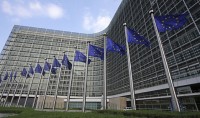Amazon, Google, Microsoft and OpenAI Join the EU’s AI Pact
September 27, 2024
The European Commission has released a list of more than 100 companies that have become signatories to the EU’s AI Pact. While Google, Microsoft and OpenAI are among them, Apple and Meta are not. The voluntary AI Pact is aimed at eliciting policies on AI deployment during the period before the legally binding AI Act takes full effect. The EU AI Pact focuses on transparency in three core areas: internal AI governance, high-risk AI systems mapping and promoting AI literacy and awareness among staff to support ethical development. It is aimed at “relevant stakeholders,” across industry, civil society and academia.
While the AI Act entered into force on August 1, it will take years before all provisions are operative. The EU AI Pact “is intended to boost engagement and foster commitments so companies get on the front-foot by taking steps to implement the law’s requirements ahead of the deadlines,” TechCrunch writes.

“The Pact also focuses on fostering info-sharing so signatories can help each other respond to the incoming requirements of the bloc’s AI rulebook and proactively develop best practices.”
Accenture, Adobe, Cisco, IBM, SAP, Salesforce and Snap are included among the U.S. companies who have signed on to the AI Pact. “French large language model company Mistral is also not on the list,” TechCrunch says, pointing out that “the company was among the AI Act’s fiercest critics.” Also absent are Anthropic, Nvidia and Spotify.
According to Silicon Republic, a spokesperson for Meta said the company has not entirely ruled out the possibility of joining the Pact at a later date.
More than half of those who did sign on have taken on “additional pledges, including ensuring human oversight, mitigating risks, and transparently labelling certain types of AI-generated content, such as deepfakes,” the European Commission notes in a news release. The EC provides the initial list of signatories in a separate explainer.
Beyond the three core areas of focus, “there’s a long-list of potential pledges that the Commission says was drafted by the AI Office, the body overseeing the AI Act,” that signatories can “essentially, pick and mix” at will, based on “which commitments work for them,” TechCrunch explains.
Examples from the list include committing to “design AI systems intended to directly interact with individuals so that those are informed, as appropriate, that they are interacting with an AI system,” and “clearly and distinguishably label AI generated content including image, audio or video constituting deepfakes.”
While the AI Act is considered ambitious and has tough penalties for non-compliance, Silicon Republic reports there are those who criticize it for relying too heavily on self-assessment when it comes to AI risks.

No Comments Yet
You can be the first to comment!
Leave a comment
You must be logged in to post a comment.